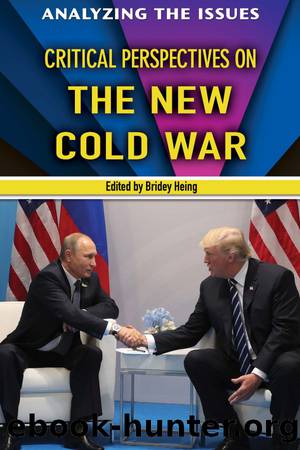Critical Perspectives on the New Cold War by Heing Bridey;

Author:Heing, Bridey;
Language: eng
Format: epub
Publisher: Enslow Publishing, LLC
Published: 2018-08-27T00:00:00+00:00
âRUSSIAâS AGGRESSIVE POWER IS RESURGENT, ONLINE AND OFF,â BY FRANK J. CILLUFFO, FROM THE CONVERSATION, AUGUST 26, 2016
The Bear is back. Itâs happening on the ground in and around Ukraine, inside the virtual inboxes of the Democratic National Committee and at American news organizations. Russian cyberattacks are yielding eye-popping headlines warning not only of a return to Cold War-style behavior, but of the relative decline of American capabilities and power.
The list of U.S. entities believed to have been breached by Russian hackers is long and troubling. It includes the White House, the State Department, the Defense Department, the NASDAQ stock exchange, the U.S. electrical grid and the Democratic National Committee. Russian cyberattackers have also attempted to hack the Moscow bureau of The New York Times.
As the targets have moved beyond U.S. government to key civilian institutions, there has been a good deal of speculation about possible motives. These range from a desire to influence the outcome of Novemberâs U.S. presidential election to the broader goal of undermining U.S.-European relations.
What do we know about Russiaâs capabilities, strategies and intents? And what should we know about this top-notch adversary, more advanced and stealthier than any other, so we can most effectively assess and address the prospect of a Russian threat?
A DEFT AND POWERFUL PLAYER
The United States remains a powerhouse of innovation and technological capacity. But the country is not alone when it comes to sophisticated tools and tradecraft in the cyber domain. Key players comprising Russiaâs âcyber arsenalâ include Russiaâs foreign intelligence service (SVR), military intelligence agency (GRU), Federal Security Service (FSB), and Federal Protective Service (FSO).
Testifying before the U.S. Senate Armed Services Committee earlier this year, U.S. Director of National Intelligence James Clapper noted that Russiaâs cyberattacks are becoming more brazen, âbased on its willingness to target critical infrastructure systems and conduct espionage operations even when detected and under increased public scrutiny.â
Since the fall of the Berlin Wall, Russiaâs security and intelligence services have practiced the worldâs second-oldest profession using high-tech tactics. Years ago, Russia was quick to recognize and integrate the potential leverage that online tools and action could offer to military doctrine, strategy and operations. But recently Russia has been honing this model of war fighting, blending electronic and real-world power into a hybrid that is more than the sum of its parts.
The first lessons came from Russiaâs 2008 conflict with neighboring Georgia. By 2013, Valery Gerasimov, chief of the General Staff of the Armed Forces of the Russian Federation, was laying out the Russian military doctrine for the 21st century with emphasis on ânonmilitary meansâ (such as political and economic actions) supported by âconcealedâ military efforts (such as activities undertaken by special operations troops â or cyberspace operatives). Starting in 2014, that integrated approach was used in battle with Ukraine.
Attacks directed against the United States and other countriesâ governments and businesses have yielded economic and diplomatic secrets that serve to strengthen Russiaâs industries and negotiating hand in matters of trade and global politics. Put bluntly, stealing the results
Download
This site does not store any files on its server. We only index and link to content provided by other sites. Please contact the content providers to delete copyright contents if any and email us, we'll remove relevant links or contents immediately.
Pale Blue Dot by Carl Sagan(4613)
Cracking the GRE Premium Edition with 6 Practice Tests, 2015 (Graduate School Test Preparation) by Princeton Review(4043)
Pocahontas by Joseph Bruchac(4027)
Unfiltered by Lily Collins(3908)
The Emotionary: A Dictionary of Words That Don't Exist for Feelings That Do by Eden Sher(3221)
The Daily Stoic by Holiday Ryan & Hanselman Stephen(3109)
Factfulness_Ten Reasons We're Wrong About the World_and Why Things Are Better Than You Think by Hans Rosling(3046)
The President Has Been Shot!": The Assassination of John F. Kennedy by Swanson James L(2972)
Sapiens and Homo Deus by Yuval Noah Harari(2843)
Rogue Trader by Leeson Nick(2824)
The 48 laws of power by Robert Greene & Joost Elffers(2804)
The Rape Of Nanking by Iris Chang(2648)
Almost Adulting by Arden Rose(2585)
Gettysburg by Iain C. Martin(2575)
The Innovators: How a Group of Hackers, Geniuses, and Geeks Created the Digital Revolution by Walter Isaacson(2487)
500 Must-Know AP Microeconomics/Macroeconomics Questions(2476)
The Plant Paradox by Dr. Steven R. Gundry M.D(2425)
In the Woods by Tana French(2411)
Make by Mike Westerfield(2199)
